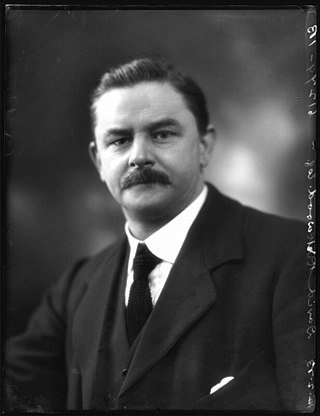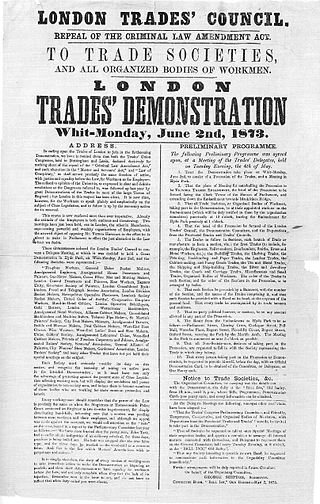Related Research Articles

The Independent Labour Party (ILP) was a British political party of the left, established in 1893 at a conference in Bradford, after local and national dissatisfaction with the Liberals' apparent reluctance to endorse working-class candidates, representing the interests of the majority. A sitting independent MP and prominent union organiser, Keir Hardie, became its first chairman.

David Kirkwood, 1st Baron Kirkwood, PC, was a Scottish politician, trade unionist and socialist activist from the East End of Glasgow, who was as a leading figure of the Red Clydeside era.
Red Clydeside was the era of political radicalism in Glasgow, Scotland, and areas around the city, on the banks of the River Clyde, such as Clydebank, Greenock, Dumbarton and Paisley, from the 1910s until the early 1930s. Red Clydeside is a significant part of the history of the labour movement in Britain as a whole, and Scotland in particular.

The Scottish Labour Party (SLP), also known as the Scottish Parliamentary Labour Party, was formed by Robert Bontine Cunninghame Graham, the first socialist MP in the Parliament of the United Kingdom, who later went on to become the first president of the Scottish National Party, and Keir Hardie, who later became the first leader of the Independent Labour Party and the Labour Party.
James MacDonald was a British trade unionist.

The Sheffield Trades and Labour Council, usually known as the Sheffield Trades Council, is a labour organisation uniting trade unionists in Sheffield.
Thomas Hargrave Bell was a Scottish socialist politician and trade unionist. He is best remembered as a founding member of both the Socialist Labour Party and the Communist Party of Great Britain and as the editor of Communist Review, the official monthly magazine of the latter.

The National Union of Scottish Mineworkers (NUSW) is a trade union in Scotland, founded in 1894 as the Scottish Miners Federation. It joined the Miners' Federation of Great Britain, and in 1914 changed its name to National Union of Scottish Mineworkers. It survives as the National Union of Mineworkers.
The Organisation of Scottish Labour is a body established under the national rules of the UK Labour Party.

The London Trades Council was an early labour organisation, uniting London's trade unionists. Its modern successor organisation is the Greater London Association of Trades (Union) Councils
Aitken Ferguson was a Scottish communist activist.
Alexander Geddes was a Scottish communist activist.

Frederick Parkin Hammill was a British trade union activist, and a co-founder of the Independent Labour Party.
Joseph James Vaughan was a British politician.
Alexander B. Moffat was a Scottish trade unionist and communist activist who was President of the Scottish Trades Union Congress and the Scottish Mineworkers Union.
Glasgow Trades Council is an association of trade union branches in Glasgow in Scotland.
George Carson was a Scottish trade unionist.
Alexander Gossip was a Scottish trade union leader and political activist.
John Battersby (1839–1922) was a Scottish trade unionist and politician.
Arthur George Field was a British trade unionist and socialist activist.
References
- ↑ Ian MacDougall, The Minutes of Edinburgh Trades Council, 1859-1873, p.xv
- ↑ William Kenefick, Red Scotland!: The Rise and Fall of the Radical Left, C. 1872-1932, pp.60, 65
- ↑ Donal Nevin, James Connolly, A Full Life
- ↑ Matthew Worley, Labour Inside the Gate: A History of the British Labour Party Between the Wars, p.95
- ↑ William Kenefick, Red Scotland!: The Rise and Fall of the Radical Left, C. 1872-1932, p.31
- ↑ Alan Clinton, The Trade Union Rank and File: Trades Councils in Britain, 1900-40, p.20
- ↑ Matthew Worley, Labour Inside the Gate: A History of the British Labour Party Between the Wars, p.104
- ↑ Alan Clinton, The Trade Union Rank and File: Trades Councils in Britain, 1900-40, p.158
- ↑ Ian MacDougall, Voices from War and Some Labour Struggles, p.353
- ↑ Angela Bartie, The Edinburgh Festivals: Culture and Society in Postwar Britain, p.62
- ↑ "Edinburgh Trade Union Council". www.edintuc.org.uk.